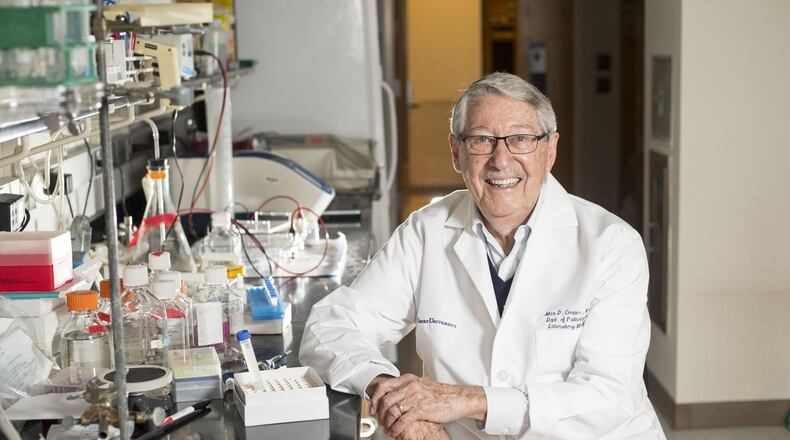Emory University School of Medicine professor Dr. Max Cooper has a detailed sketch on his office wall illustrating research he helped design that may look like hieroglyphics to some, but scientists say it’s among the most important medical discoveries in decades.
Cooper’s research, done with the famed Australian scientist, Dr. Jacques Miller, was recognized Tuesday with one of the most-acclaimed scientific awards in the world, the Japan Prize.
Their work has contributed significantly to the advancement of anti-cancer and anti-cytokine drugs for the treatment of diseases like rheumatoid arthritis, prize officials say.
Cooper is believed to be the first person with ties to Georgia to win the $420,000 prize.
Not bad for a humble Mississippi boy who had self-doubts about his ability to learn the technology to conduct useful research in immunology.
“I’m persistent,” Cooper, 84, said in an interview before he traveled to Japan for the prize announcement. “And I’m lucky.”
The Japan Prize Foundation each year considers the nominations of 13,000 prominent scientists and researchers from around the world. Since its inception in 1985, the Japan Prize Foundation has awarded the prize to 91 laureates from 13 countries.
“Their contributions to our understanding of human and animal B-cells and T-cells — the highly-specialized cells that respond to germs — have helped close the gap in developing meaningful outcomes in prevention and possible cures for these diseases, and shows enormous potential for future discoveries,” Hiroshi Nakamura, senior executive director of the Japan Prize Foundation, said in a statement.
Cooper has been at Emory for 10 years, joining its pathology department as the Georgia Research Alliance’s Eminent Scholar in Developmental Immunology.
Cooper became a pediatrician after graduating from the Tulane University School of Medicine. From 1963, he conducted research at the University of Minnesota. He found the work fascinating. Some patients had recurring infections. He wanted to know why.
“In order to understand why they were so susceptible, we need to learn why our immune system develops,” Cooper said.
Cooper faced some challenges. He said he virtually had no laboratory skills and no grant funding.
Cooper conducted research, first with birds, then with other animals that initially bore “unexciting results.” He and others continued their work and eventually discovered B and T cells that start in the bone marrow migrate to the spleen and lymph nodes, where they collaborate to mount immune responses.
Cooper, 84, who celebrates his 58th wedding anniversary next month, plans share much of his prize with his wife, proving he’s also a smart husband. He said he’ll use part of the prize money for additional research.
About the Author




